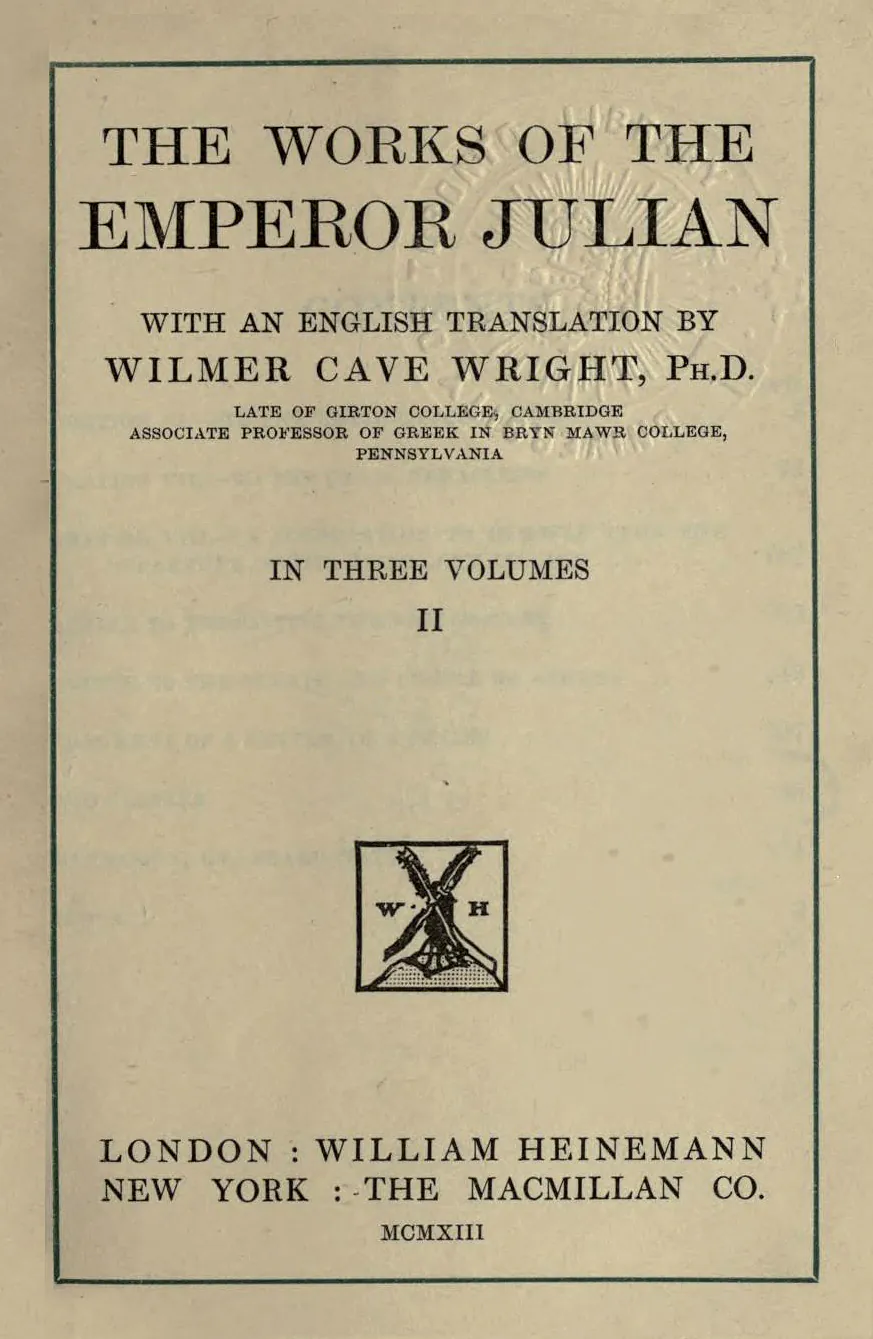[A]
καὶ ὁ χειμὼν ἐκεῖ πρᾳότερος εἴτε ὑπὸ τῆς θέρμης τοῦ ὠκεανοῦ· στάδια γὰρ ἀπέχει τῶν ἐννακοσίων οὐ πλείω, καὶ διαδίδοται τυχὸν λεπτή τις αὔρα τοῦ ὕδατος, εἶναι δὲ δοκεῖ θερμότερον τὸ θαλάττιον τοῦ γλυκέος· εἴτε οὖν ἐκ ταύτης εἴτε ἐκ τινος ἄλλης αἰτίας ἀφανοῦς ἐμοί, τὸ πρᾶγμα ἐστι τοιοῦτον, ἀλεεινότερον ἔχουσιν οἱ τὸ χωρίον οἰκοῦντες τὸν χειμῶνα, καὶ φύεται παρ ̓ αὐτοῖς ἄμπελος ἀγαθή, καὶ συκᾶς ἤδη εἰσιν οἳ1εἰσιν οἳ Cobet, τινές εἰσιν οἳ Hertlein, MSS. ἐμηχανήσαντο, σκεπάζοντες
[B]
αὐτὰς τοῦ χειμῶνος ὥσπερ ἱματίοις τῇ καλάμῃ τοῦ πυροῦ καὶ τοιούτοις τισίν, ὅσα εἴωθεν εἴργειν τὴν ἐκ τοῦ ἀέρος ἐπιγιγνομένην τοῖς δένδροις βλάβην. ἐγένετο δὴ οὖν ὁ χειμὼν τοῦ εἰωθότος σφοδρότερος, καὶ παρέφερεν ὁ ποταμὸς ὥσπερ μαρμάρου πλάκας· ἴστε δήπου τὸν Φρύγιον λίθον τὸν λευκόν· τούτῳ ἐῴκει μάλιστα τὰ κρύσταλλα,2τὸν—κρύσταλλα Hertlein suggests, ᾧ ἐῴικει μάλιστα τοῦ λευκοῦ τούτου τὰ κρύσταλλα, MSS. μεγάλα καὶ ἐπάλληλα φερόμενα· καὶ δὴ καὶ συνεχῆ ποιεῖν ἤδη τὸν πόρον ἔμελλε
[C]
καὶ τὸ ῥεῦμα γεφυροῦν. ὡς οὖν ἐν τούτοις ἀγριώτερος ἦν τοῦ συνήθους, ἐθάλπετο δὲ τὸ δωμάτιον οὐδαμῶς, οὗπερ ἐκάθευδον, ὅνπερ εἰώθει τρόπον ὑπογαίοις3ὑπογαίοις Naber, cf. Pliny Ep. 2. 17; ὑπὸ ταῖς Hertlein, MSS. καμίνοις τὰ πολλὰ τῶν οἰκημάτων ἐκεῖ θερμαίνεσθαι, καὶ ταῦτα ἔχον εὐτρεπῶς πρὸς τὸ παραδέξασθαι τὴν ἐκ τοῦ πυρὸς ἀλέαν· συνέβη δ ̓ οἶμαι καῖ τότε διὰ σκαιότητα τὴν ἐμὴν καὶ τὴν εἰς ἐμαυτὸν πρῶτον, ὡς εἰκός, ἀπανθρωπίαν· ἐβουλόμην γὰρ ἐθίζειν ἐμαυτὸν ἀνέχεσθαι τὸν ἀέρα ταύτης ἀνενδεῶς ἔχοντα τῆς βοηθείας. ὡς δὲ ὁ χειμὼν ἐπεκράτει καὶ ἀεὶ μείζων ἐπεγίνετο,
[D]
θερμῆναι μὲν οὐδ ̓ ὣς ἐπέτρεψα τοῖς ὑπηρέταις τὸ οἴκημα, δεδιὼς κινῆσαι τὴν ἐν τοῖς τοίχοις ὑγρότητα, κομίσαι δ ̓ ἔνδον ἐκέλευσα πῦρ κεκαυμένον καὶ ἄνθρακας λαμπροὺς ἀποθέσθαι παντελῶς μετρίους. οἱ δὲ καίπερ ὄντες οὐ πολλοὶ παμπληθεῖς ἀπὸ τῶν τοίχων ἀτμοὺς ἐκίνησαν, ὑφ ̓ ὧν κατέδαρθον. ἐμπιμπλαμένης δέ μοι τῆς κεφαλῆς ἐδέησα μὲν ἀποπνιγῆναι,
[A]
The winter too is rather mild there, perhaps from the warmth of the ocean, which is not more than nine hundred stades stades distant, and it may be that a slight breeze from the water is wafted so far; for sea water seems to be warmer than fresh. Whether from this or from some other cause obscure to me, the fact is as I say, that those who live in that place have a warmer winter. And a good kind of vine grows thereabouts, and some persons have even managed to make fig-trees grow by covering them in winter with a sort of garment of wheat straw and with things of that sort,
[B]
such as are used to protect trees from the harm that is done them by the cold wind. As I was saying then, the winter was more severe than usual, and the river kept bringing down blocks like marble. You know, I suppose, the white stone that comes from Phrygia; the blocks of ice were very like it, of great size, and drifted down one after another; in fact it seemed likely that they would make an unbroken path and bridge the stream.
[C]
The winter then was more inclement than usual, but the room where I slept was not warmed in the way that most houses are heated, I mean by furnaces underground; and that too though it was conveniently arranged for letting in heat from such a fire. But it so happened I suppose, because I was awkward then as now, and displayed inhumanity first of all, as was natural, towards myself. For I wished to accustom myself to bear the cold air without needing this aid. And though the winter weather prevailed and continually increased in severity,
[D]
even so I did not allow my servants to heat the house, because I was afraid of drawing out the dampness in the walls; but I ordered them to carry in fire that had burned down and to place in the room a very moderate number of hot coals. But the coals, though there were not very many of them, brought out from the walls quantities of steam and this made me fall asleep. And since my head was filled with the fumes, I was almost choked.



